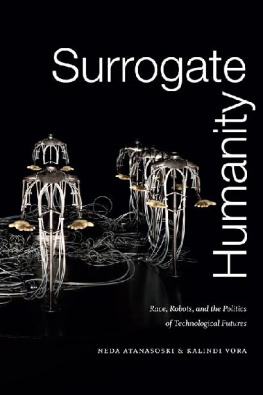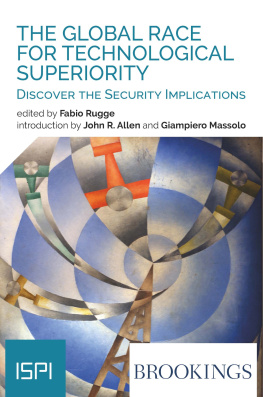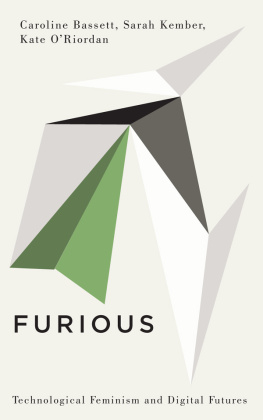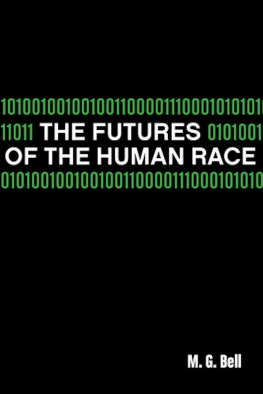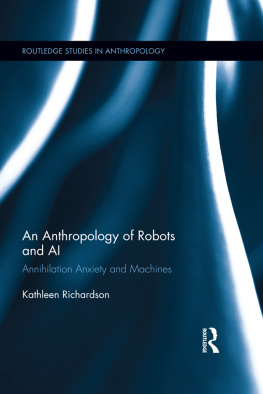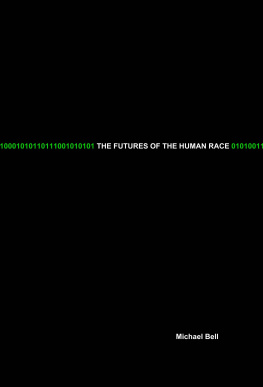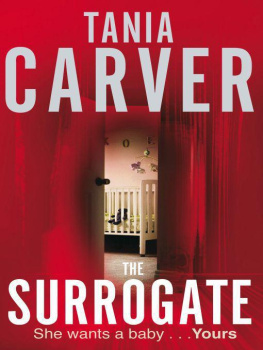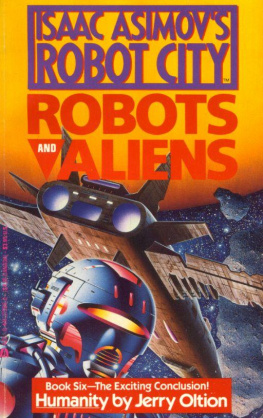PERVERSE MODERNITIES
A series edited by Jack Halberstam and Lisa Lowe
Surrogate Humanity
Race, Robots, and the Politics of Technological Futures
NEDA ATANASOSKI AND KALINDI VORA
Duke University PressDurham and London2019
2019 Duke University Press
All rights reserved
Printed in the United States of America on acid-free paper
Designed by Courtney Leigh Baker
Typeset in Whitman by Westchester Publishing Services
Library of Congress Cataloging-in-Publication Data
Names: Atanasoski, Neda, author. | Vora, Kalindi, [date] author.
Title: Surrogate humanity : race, robots, and the politics of technological futures / Neda Atanasoski and Kalindi Vora.
Description: Durham : Duke University Press, 2019. | Series: Perverse modernities | Includes bibliographical references and index.
Identifiers: LCCN 2018033902 (print) | LCCN 2018044223 (ebook)
ISBN 9781478004455 (ebook)
ISBN 9781478003175 (hardcover : alk. paper)
ISBN 9781478003861 (pbk. : alk. paper)
Subjects: LCSH : RobotsSocial aspects. | AutomationSocial aspects. | Technological unemploymentSocial aspects. | Artificial intelligenceSocial aspects. | Technological innovationsSocial aspects. | TechnologySocial aspects. | RoboticsHuman factors.
Classification: LCC HD 6331 (ebook) | LCC HD 6331 .A 83 2019 (print) | DDC 338/.0640112dc23
LC record available at https://lccn.loc.gov/2018033902
COVER ART: Peter William Holden. Vicious Circle, Choreographed Robots . Courtesy of the artist. Photograph by Medial Mirage / Matthias Mller.
Contents
Part of the work of collaborative scholarship is to bring forth a new subject larger than the sum of its parts. We have been friends and collaborators since we were postdoctoral scholars sharing an office in the Anthropology Department at UC Berkeley in 2007. On our daily walks to the office we discovered a shared intellectual genealogy (Nedas PhD advisor, Lisa Lowe, was a graduate of Kalindis doctoral institution) that deeply influenced our research trajectories. We realized that our conversations about research for our first books were also generating a collaborative project on race, technology, and politics. Over the years, we have had the chance to extend our collaboration with many interlocutors who have enriched our thinking, and we are grateful to our friends, students, and colleagues for sharing news stories, provocations, and asking us difficult questions.
First and foremost, we wish to thank Lisa Lowe, who has been a friend, ally, mentor, and supporter of us and the project since its inception. Her writings on race, liberalism, and modernity, and her boundless generosity in thinking out loud with us have been impactful and inspirational, as is evident throughout the pages of this book. We are also grateful to Neferti Tadiar, who supported this project at its formative stages. Since 2012, we have had many unique opportunities to travel together and to present our work in intellectually stimulating venues. The discussions and questions that followed our talks pushed our thinking and writing in unexpected and exciting ways. Michael Dango and Rowan Bayne invited us to present our very first writing from the book at the University of Chicago Post-45 Workshop. The fruitful exchange we had with graduate students and faculty there shaped our first publication from the project that appeared in the journal Catalyst: Feminism, Technoscience, Theory , from which we expanded and developed a number of chapters. We are also indebted to the Technoscience Salon in Toronto, and especially its organizers Michelle Murphy and Natasha Meyers; Aimee Bahng and the Gender Research Institute at Dartmouth; Redi Koobak, Nina Lykke, and Madina Tlostanova at Linkping University in Sweden; the Digital Cultures Research Lab at Leuphana University in Lneburg, Germany for workshopping draft chapters; Nishant Shah and Martin Warnke at Leuphana University, who invited us to present our work in Germany and allowed us the once-in-a-lifetime chance to think, write, take walks, and share meals with fellow scholars at a villa in Tuscany; Lisa Parks and her students at MIT ; and Lisa Lowe and the Center for the Humanities at Tufts University.
Since 2012, many mutual friends and colleagues have provided feedback on parts of our writing and thinking. We are grateful to Banu Subramaniam, Deboleena Roy, and Angie Willey for ongoing discussions about the meaningfulness and significance of feminist collaboration. Banu continually provided us with grist for our mill, and many of the articles she sent us along the way have made their way into the book. Lisa Cartwright and Cristina Visperas offered significant feedback and editing suggestions for our first publication from the project in Catalyst . We also thank Lisa Lowe, Jennifer Terry, Michelle Murphy, Julietta Hua, Xiao Liu, Don Donham, Fatima El-Tayeb, Lilly Irani, Saiba Varma, Felicity Amaya Schaeffer, Karen Barad, Lisbeth Haas, Kasturi Ray, Alex Rosenblat, Alys Eve Weinbaum, Elizabeth Losh, and Grace Hong for offering feedback or brainstorming with us about our work.
UC San Diego and UC Santa Cruz provided us with funding that enabled us to get the project off the ground in 2015, and to bring it to completion in 2018. A UCSD Academic Senate grant made possible our travel to Boston, where we conducted interviews at the MIT robotics museum and at the MIT Media Lab. We thank Kelly Dobson for an incredible tour of the space and for spending time with us during our research trip. Malathi Iyengar was our graduate student researcher who helped us to compile a rich and varied archive of Cold Warera sources on robotics, automation, and race. The UC Santa Cruz Academic Senate Special Research Grant funded Neda to travel to Germany with Kalindi and allowed us to put the finishing touches on the manuscript. At this stage, Taylor Wondergem was a graduate student researcher extraordinaire, who helped us with our citations, bibliography, images, and much, much more. She was an enthusiastic companion to us at the finish line.
Working with Duke University Press has been a pleasure. We thank Courtney Berger and Sandra Korn for their enthusiasm about the manuscript and guidance throughout the publication process. We also thank our series editors, Jack Halberstam and Lisa Lowe, for including us in their series, which we both have admired for many years. Finally, we thank the two anonymous reviewers at Duke University Press, whose suggestions for revisions made this a much better book than it otherwise would have been.
Neda
I have been fortunate to be surrounded by generous and innovative thinkers committed to a feminist and antiracist politics at UC Santa Cruz, and especially in my home department of Feminist Studies and the Program in Critical Race and Ethnic Studies. I am deeply grateful to Felicity Amaya Schaeffer, Nick Mitchell, Megan Moodie, Karen Barad, Christine Hong, and Neel Ahuja for their steadfast friendship, camaraderie, laughter, and many long conversations, and for, at various times, reading and commenting on parts of the manuscript, writing and thinking with me, or suggesting news stories and sources that made this a more thoughtful book. I am also thankful to Lisbeth Haas, Shelley Stamp, Lisa Rofel, Marcia Ochoa, Bettina Aptheker, Madhavi Murty, Irene lusztig, Adrian Brasoveanu, and Soraya Murray, whose support has sustained me as a scholar and teacher. Thinking with my graduate students has profoundly enriched my intellectual life. Erin McElroy, Yizhou Guo, Cecelia Lie, Taylor Wondergem, Francesca Romeo, Noya Kansky, Dana Ahern, Sheeva Sabati, Jess Whatcott, and Trung Nguyen have kept me inspired and excited about our work and its potential to change the world in which we live. I also thank Jennifer Suchland and the Womens, Gender and Sexuality Studies Department faculty and graduate students at the Ohio State University for their hospitality and fruitful intellectual exchanges about the project.

